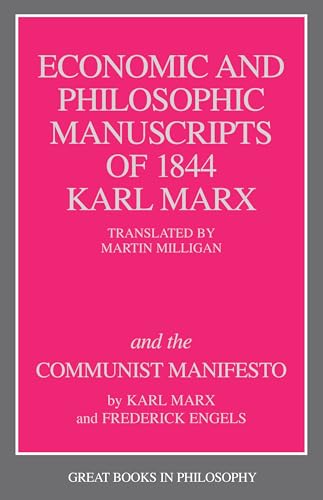The Economic and Philosophic Manuscripts of 1844 and the Communist Manifesto (Great Books in Philosophy)
Karl Marx; Fredrick Engels
BOOK REVIEW

The haunting echoes of past revolutions merge with the spectral whispers of Karl Marx and Friedrich Engels in The Economic and Philosophic Manuscripts of 1844 and the Communist Manifesto. These texts are not merely academic readings; they are explosive commentaries on capitalism's inhumane grasp on human potential. In a world increasingly polarized by wealth disparity, the relevance of these works resonates with an unsettling intensity. Let's delve deep into these manuscripts and discover their profound impacts on thought, society, and our very essence as humans.
Written against a backdrop of industrial turmoil, where the toil of the working class was traded for shoddy wages and endless hours, Marx and Engels captured the essence of human alienation. In the Economic Manuscripts, the duo articulates a devastating critique of capitalism, detailing how it commodifies labor, reduces individuals to mere cogs in a vast machine, and distorts the natural human experience. It's a heartfelt plea, filled with urgency, illuminating the struggles of workers yearning for dignity and agency. Can you feel the ground beneath your feet tremble with the weight of their observations?
The Communist Manifesto acts as a clarion call, urging unity among the oppressed. Here, Marx and Engels assert that history is defined by class struggles-a relentless battle between the bourgeoisie and the proletariat. This duality invites readers into a world of conflict where every revolution is but a prelude to a new social order. The Manifesto isn't just rhetoric; it's a spark igniting the flames of movements around the globe-bolstering revolutions in Russia, China, Cuba, and beyond. Each line reverberates with the promise of a world where the workers can reclaim their power. Feel that electric pulse? That's the heart of a movement yearning for liberation.
Reader reactions to these foundational texts have been as diverse as the ideologies they have inspired. Critics argue that Marx's vision is utopian, oversimplifying complex economic systems and underestimating human nature. Others cite historical failures of communist regimes as evidence against Marxist theory. Yet, can we dismiss the undeniable insight these manifestos provide? The discourse surrounding them is a microcosm of the many conversations we face today about inequality, justice, and the structures that govern our lives. Readers find themselves grappling with the text's implications, weighed down by the urgency of its message.
In the spirit of our complex historical present, it's critical to acknowledge how Marx and Engels have traveled through time-challenging the status quo at every turn. Their ideas have shaped the worldviews of countless reformers and activists, inspiring thinkers like Rosa Luxemburg, Vladimir Lenin, and more recently, contemporary movements advocating for social justice. The seeds of their doctrines blossom anew across campuses, political forums, and protest streets, reminding us that the issues they raised are not relics of the past; they are living, breathing problems demanding our attention.
Yet, as these powerful texts draw you in, they also push you to reflect. Will you accept the easy confines of complacency, or will you dare to interrogate the capitalist structures that benefit the few while shattering the dreams of the many? The act of reading these manuscripts could very well be a revolutionary act in its own right, forcing you to confront the uncomfortable truth of our socioeconomic landscape. Feel that tension rise? It's the anxiety of transformation.
As we stand on the precipice of change, the importance of The Economic and Philosophic Manuscripts of 1844 and the Communist Manifesto cannot be overstated. Embrace the radical possibility they offer-the chance to engage with the world, to question your surroundings, and to envision a more equitable future. Don't allow the echoes of past struggles to fade into silence. Grab these texts, let them stir your deepest convictions, and propel you forward into a dialogue that could reshape the future.
In conclusion, these manuscripts are not mere relics of political theory; they are fervent calls to action, stirring within us a yearning for change. Ignoring them would be tantamount to turning away from the very possibility of justice in an unjust world. So, plunge into Marx and Engels' radical vision of humanity-a vision that might just awaken the revolutionary spirit within you. 🌍✨️
📖 The Economic and Philosophic Manuscripts of 1844 and the Communist Manifesto (Great Books in Philosophy)
✍ by Karl Marx; Fredrick Engels
🧾 243 pages
1988
#economic #philosophic #manuscripts #1844 #communist #manifesto #great #books #philosophy #karl #marx #KarlMarx #fredrick #engels #FredrickEngels